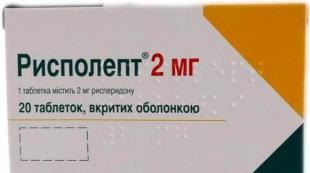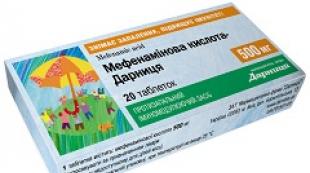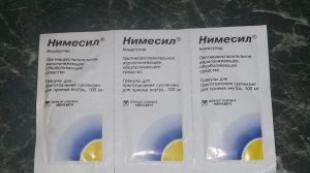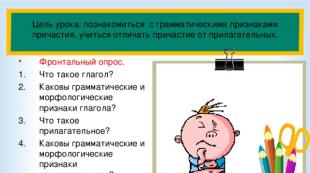Chronic, sluggish inflammatory process in the mouth. How to treat oral cavity inflammation. Chronic aphthous stomatitis
Inflammation of the mouth and gums occurs as a consequence of local action or as one of the manifestations of any systemic disease. Factors of local origin include, in particular: neglect of hygiene, consequences of tooth decay, excessive deposits of tartar, defects in dental restoration, excessive alcohol consumption and smoking. Among the general factors, the most common are: gastrointestinal diseases, malnutrition, diabetes, hormonal disorders, pregnancy, drug intoxication, and some occupational diseases. If the disease concerns only the gums, then this is accompanied by redness, weakening, painful formation of warts, and there is also a tendency to bleeding.
There are various forms inflammation of the oral cavity. In most cases, this is due to microbes entering the body with food, as well as a general weakening of the body, for example, after fever and some other diseases. Failure to maintain hygiene of the mother's nipples and unclean bottles lead to the ingress of microbes, which causes inflammatory processes. In addition, the causes of the disease can be the irritation of sharp teeth or too vigorous brushing of the oral cavity. Certain chemicals, particularly improperly prescribed mercury, can also trigger illness. In some cases, microbes can multiply, for example, in unclean milk. Inflammation of the oral cavity is a disease mainly of children, and only in the ulcerative form is it characteristic of adults.
Symptoms of oral inflammation
Common symptoms of oral inflammation include a feeling of heat in the mouth, redness, dryness, and excessive sensitivity. At the same time, children become capricious and irritable, and difficult to care for. They often reject the breast of a nursing mother. High fever and symptoms of indigestion (vomiting) may also occur. Quite often the disease occurs during a fever.
Treatment of oral inflammation with folk remedies
Treatment of oral inflammation begins, first of all, with eliminating the causes of irritation, if they are the cause of the disease. In some cases, oral treatment helps treat the underlying disease. In both cases, a diet excluding spicy foods is recommended, as well as a complete ban on alcohol and tobacco.
In herbal medicine, the following remedy is used to treat inflammatory diseases of the oral cavity: pour about a half-centimeter layer of liquid linden honey into the bottom of a small saucepan. They take a very old and very rusty nail. Having heated it red-hot, put it in honey. A thick black substance like tar forms around the nail. This black substance should be lubricated on the gums, mainly at night, before going to bed. The gum abscess usually breaks out soon, the swelling quickly subsides, and the patient’s health improves. Rust plays a very important role in this case. When heating a nail, do not blow on or touch it to prevent rust.
To strengthen your gums and cleanse your teeth from plaque, it is useful to chew honey in a honeycomb.
For diseases of the oral mucosa and inflammation of the gums, you can use an infusion of chamomile with honey. Pour 3 tablespoons of dry crushed chamomile flowers into 0.5 liters of boiling water, let it brew for 15 minutes in a water bath, cool under the lid. Then strain, dilute 2 tablespoons of bee honey in the infusion and use for rinsing.
Pour 40 g of crushed propolis with 70% alcohol (100 g), leave for 7-10 days, shaking occasionally, then filter through gauze. By adding water to the alcohol, bring the solution to 4% concentration and use it to lubricate the gums. The course of treatment is from 3 to 10 applications.
At home, oral diseases are treated with St. John's wort oil. To prepare it, take 1 part of St. John's wort flowers and 2 parts of its leaves. Then the herb is placed in a transparent bottle and filled with four parts of olive oil. The oil is then left in the sun for two weeks, followed by a straining procedure. After this, the oil, which has taken on a blood-red color, needs to be heated to 50C, cooled slightly, moistened with a swab and wiped the areas affected by inflammation five to six times during the day.
Inflammatory phenomena in the mouth are not uncommon. Therefore, it is important to know the factors that provoke this or that inflammation of the oral mucosa, as well as methods of treatment and prevention of such pathologies.
Dentists have to deal with such inflammatory pathologies almost every day. And since such diseases have a variety of causes, before prescribing a course of treatment, it is necessary to first find out why the disease manifested itself.
In order to prescribe effective treatment to a patient, it is important to first understand the cause of the disease. The most common of them:
- violation of hygiene rules;
- caries and pulpitis;
- gum disease;
- injuries in the mouth caused by braces, dentures or implants;
- development of dental calculus;
- incorrect selection of dental caps.
Inflammation in the mouth can also be caused by reasons such as:
- allergy;
- injuries;
- heart and gastrointestinal problems;
- infections.
Bad habits can also provoke the disease. But most often, such inflammation of the mucous membrane is caused by allergic processes in the body.
Kinds
Inflammation of the oral mucosa is the main symptom of such pathologies as:
- stomatitis;
- glossitis;
- cheilitis;
- different types of gingivitis;
- stomatitis, which is caused by herpes;
- inflammation of the mucous membrane due to injury.
Allergic diseases are considered the most common among these pathologies. Such inflammatory diseases manifest themselves in the form of chronic aphthous stomatitis. The palate, gums, and tongue are affected. In this case, the disease makes itself felt in single ulcers, appearing periodically over many years. In some patients, such ulcers (aphthae) occur due to contact with washing powders or any cosmetic product, for example, hair dye, lipstick or perfume. Allergens include tooth elixirs and some toothpastes. In some cases, food allergies can cause oral allergies.
Symptoms
In each case of dental ailments, the symptoms are the same:
- severe pain and purulent lesions in the mouth;
- discomfort and pain in the gums, making it impossible to chew food and swallow it;
- irritation, swelling and painful discomfort on the lips and cheeks;
- temperature increase:
- inability to drink hot drinks;
- areas of redness or purulent plaque;
- severe pain and purulent lesions in the throat area.
Visually, inflammation of the oral cavity is manifested not only by redness of varying intensity, swelling of the palate, tongue and gums, erosion or ulcers, and sometimes blisters similar to chickenpox.
Moreover, diseases of the mucous membrane occur immediately on its entire surface. The following symptoms may also occur:
- inflammation of the palate;
- itching sensation;
- the appearance of chronic dry mouth;
- copious amounts of saliva;
- enlarged lymph nodes;
- loss of taste perception;
- pain or discomfort while talking.
If inflammation in the mouth occurs due to poisoning or the action of any chemical substance, pigment spots may appear on the surface of the gums and a metallic taste is often added to these sensations by weakness, a feeling of apathy, digestive disorders, and numbness of the tongue.
In case of mechanical damage, such as blows or scratches from fragments of teeth, inflammation of the oral mucosa is accompanied by the formation of hematomas.
Diagnostics
Without the use of medical diagnostic methods, this can be done by independently examining your mouth and analyzing your sensations.
At the same time, it is important to know whether there are allergic diseases that can cause such phenomena, because the doctor will have to rely on this to prescribe a course of treatment.
This is sometimes quite enough to make a correct diagnosis. But it happens that it is necessary to carry out a special examination of the cavity - studying the color of the lesions using special dyes, conducting a general and biochemical blood test, examining scrapings from one of the lesions with a microscope, as well as conducting allergy tests. The highest quality results are obtained from tests that simulate natural contacts with allergic substances, for example, an application test on the surface of the mucosa. Quite often, allergic stomatitis is caused by painkillers applied by application to the gums.
If inflammation in the mouth appears suddenly or as a result of the work of a dentist, you should urgently go to the clinic, where a special examination will be carried out. For such a phenomenon is often the result of some kind of allergic reaction, and often not only in the oral cavity.
Methods of therapy
The very first step in treating mouth inflammation should be to avoid certain foods. By stopping the consumption of certain foods, you can reduce pain and cure inflammation in the mouth. To reduce irritation, do not consume hot foods and drinks, as well as salty and spicy foods. It is unacceptable to use products that contain citrus fruits, because they cause irritation in the mouth. You should also refrain from hot peppers and over-salted dishes.
Then it is necessary to remove the cause of the mucosal disease in order to successfully cope with the inflammation. In this case, it is important to consult a doctor, since only a specialist can accurately determine the cause of the disease and prescribe the correct treatment, which depends on the reasons that caused the inflammation. Especially if the inflammation occurs as a result of allergies.
Rinse
Rinsing the mouth with special preparations will reduce the likelihood of harmful microorganisms appearing. Daily rinsing, attention to your body, and accuracy will help keep your mouth healthy.
If diseases of the mucous membrane were caused by mechanical actions, the mouth is treated with an antiseptic. For burns, some analgesic is added to therapy.
How to treat diseases of the mucous membrane that arise after contact of the cavity with a chemical substance? The mouth must be rinsed with a neutralizing agent and antiseptic and antiallergic drugs and compresses are used.
Medicines
The most common manifestation of mucosal disease in recent times is allergies. It can result from contact with medications or after brushing teeth. With such oral pathology, an important point is to identify and eliminate the allergen and use a product that neutralizes it.
One of the methods of treating aphthous stomatitis is the use of antiallergic medications (fenistil, suprastin, etc.). In addition to these medications, the doctor must prescribe vitamin therapy, which requires vitamins of groups B, C and PP, as well as medications containing folic acid.
Local treatment is carried out using painkillers, aseptic and other drugs. This could be one of such remedies as Cholisal with Kamistad, as well as solcoseryl with Actovegin.
Treatment with folk remedies
Most often, patients have a question about how to relieve swelling of the mucous membrane and other signs of inflammation using folk remedies. Of the traditional medicine preparations, the most popular are herbal infusions for rinsing, for example, with chamomile, eucalyptus, calendula and other herbs. To improve epithelization, oils are prescribed, for example, rose hips or sea buckthorn, as well as Kalanchoe or aloe juice.
If the inflammation is of a fungal nature, rinsing with a solution of soda, Lugol's or weak potassium permanganate, and aseptic decoctions of juniper needles, yarrow herb or calendula flowers are recommended as an aid to the main course of treatment.
If thrush has developed in the oral cavity, doctors advise using honey and potatoes. But these products contain carbohydrates, which are food for fungi. Therefore, such remedies are not always effective, and honey can also cause allergies.
Why does the oral cavity become inflamed? How to treat inflammation of the mucous membrane of the mouth and tongue, what treatment is the most effective? The answers to these questions are of interest to those who have ever suffered a similar illness. In this article we will also talk in detail about the causes of stomatitis.
Inflammation is the main symptom of herpetic infection, trauma, gingivitis, fungal infections, and allergic diseases. In this case, the symptoms of the pathology will always be the same.
Patients complain of soreness in the mouth, gums, lips, and throat. They experience swelling, inflammation of the gums and irritation of the mucous membrane of the mouth and lips, and urgent treatment is required. Patients often develop ulcers, especially if treatment is not started in a timely manner. In the mild stage, patients are advised to rinse with herbs, antiseptics, and sometimes antibiotics as prescribed by the doctor.
At a mild stage of inflammation, patients are advised to rinse their mouth
Inflammation is also called stomatitis. The membranes are affected due to certain processes in the body that must be paid attention to. It is worth discussing separately physical injuries and burns.
Inflammation in the oral cavity is not such a rare occurrence. Dentists encounter it almost every day. In order to prescribe effective treatment to a patient, it is important to first understand the cause of the disease. The most common of them:
- failure to comply with hygiene standards;
- caries and its improper treatment;
- tartar;
- incorrectly selected dental guards.
Treatment of inflamed oral mucosa
When a person with this problem comes to a specialist for a consultation, he needs to conduct a high-quality examination for the presence of various pathologies, the doctor conducts a study, does allergy tests, and prescribes an examination with other specialists.

In case of inflammation of the oral cavity, you should consult a dentist
If the oral mucosa is inflamed, the specialist prescribes treatment according to the most effective scheme individually, since incorrectly selected actions can significantly aggravate the situation.
For example, if the disease was caused by mechanical stress, antiseptic treatment is used. If a burn is to blame, then analgesics are added to the main treatment to relieve pain.
If the disease occurs as a result of contact of the mucous membrane with chemical components, the mouth must be rinsed with neutralizing agents, special devices and antiseptics are used, and compresses are applied to the affected area.
Another therapeutic tactic is required when an infection is involved in the process (herpes, scarlet fever, chickenpox). In such situations, general therapy is required, which involves the use of drugs to strengthen the body's defenses, antiviral drugs, local ointments.
If a person does not maintain oral hygiene, the doctor prescribes professional cleaning and explains in detail to the patient what hygiene measures need to be taken. At a mild stage of the inflammatory process, this will be enough.
When stomatitis is accompanied by swelling or the formation of ulcers, or a person also experiences pain when eating food, it is necessary to visit a dentist and undergo a course of treatment, otherwise the disease will become chronic and other organs will suffer.
Why do mucous membranes become damaged and peel off?
Sometimes the patient complains of soreness in the palate. This often occurs when the mucous part is damaged during drinking hot drinks. Mucosal tissues are very delicate and vulnerable. Often their integrity is destroyed as a result of eating solid foods. Painful symptoms usually appear after two days. This occurs due to the entry of pathogenic microflora, which causes the inflammatory process. To exclude this, you need to use a solution with vitamin A and rinse with herbal infusions.
Stomatitis often appears when consuming citrus fruits and seeds, especially if you click them with your teeth. It is necessary to minimize the consumption of sour foods. If inflammation occurs, you need to use an antiseptic.

One of the causes of oral inflammation is the consumption of citrus fruits.
The mucous membrane peels off due to existing neurological disorders. Gained widespread popularity following reasons:
- regular emotional and nervous experiences, constant intellectual stress;
- chemical damage due to excessive alcohol consumption;
- defeat by hot dishes;
- diseases of the gastrointestinal tract system.
If a person has problems with the digestive system, the mucous part begins to peel off completely spontaneously. It is imperative to visit a doctor who will diagnose and prescribe the correct treatment.
For chemical burns therapy is limited to the use of rejuvenating drugs. If the immune system or nerves are to blame, then it is advisable to use means to strengthen the body's defenses. You need to remember about the rinsing procedure, the use of herbs and special medications.
Oral inflammation and piercings
Sometimes stomatitis occurs in those who like tongue punctures. This is explained by the fact that before the puncture you should carry out proper sanitation of the oral cavity and take special vitamin and mineral complexes.

Piercing is a common cause of oral inflammation
Dentists strongly advise against piercing anything in the mouth, otherwise the risk of infection and various diseases increases.
Allergies and stomatitis
Today, with the deterioration of the environmental situation, poor lifestyle, and bad habits, modern people are increasingly suffering from allergies. This disease can be caused by medications, food, dust, plants, etc.
The mucous membrane in the mouth often becomes inflamed due to contact stomatitis. Patients are concerned about severe burning, dryness, and pain when swallowing. The mucous membranes and tongue swell, teeth become imprinted, ulcers, blisters, and other formations appear.
To get rid of this problem, it is important to eliminate the irritating factor. For internal use, antihistamines are used, which can be prescribed as compresses.
One of the main principles of treatment is the prescription of antihistamines. An important part of treatment is therapy with vitamin complexes. Antiseptics, analgesics and other drugs in the form of gels, ointments, and pastes are used for local treatment.
Smoking and stomatitis
Those who abuse smoking often experience inflammation of the oral mucosa. Such people cannot prevent the likelihood of an inflammatory process, since the influence of tobacco is much stronger. This substance inhibits all beneficial flora.

Smoking is one of the causes of oral inflammation
Therefore, it is not surprising that this problem is common among smokers. If a person does not give up this habit in favor of health, the consequences can be very sad. In this case, the patient must rinse and treat the mucous membranes with ointments and antiseptics.
When a person chooses a healthy lifestyle, the disease can immediately go away, but if a person continues to smoke, despite the problems, the pathological process will only become more complicated. Nicotine can affect thin layers and protective functions.
Stomatitis - a disease of diabetics
It is also worth focusing on this group of patients. The fact is that with diabetes, the mucous membranes in the mouth are almost always inflamed, insufficiently moisturized, and cracked.
Treatment of stomatitis in people with diabetes is quite complicated. Patients should take oral sanitation with particular seriousness and regularly irrigate the oral cavity with antiseptics.
Prevention to prevent any inflammation is quite simple. Every person should regularly take care of themselves, brush their teeth, use dental floss, and rinse their mouth thoroughly after meals.
It is necessary to pay close attention to your dietary habits. Eliminate unhealthy and difficult to digest foods. Stop smoking and do not abuse alcoholic beverages. Take vitamin complexes and strengthen your immune system.
Inflammation of the mucous membranes of the mouth, nose, stomach, throat, and female genital organs is a rather unpleasant disease that occurs in a huge number of people. This diagnosis can only be made by a specialist after the person has undergone a full examination. The disease should not be left to chance; treatment should be started immediately. Thanks to this, a person will be able to avoid unwanted consequences and complications.
Inflammation of the gastric mucosa
Causes of inflammation of the gastric mucosa
Inflammation of the stomach can occur due to dietary factors; all you need to do is overeat, chew food poorly, eat a lot of hot and spicy foods, drink alcoholic beverages or take any medications. All the factors listed above can irritate the gastric mucosa and cause pain, as well as local swelling. Due to systematic irritation, chronic gastritis can develop.
Treatment of inflammation of the gastric mucosa
If a person begins to have inflammation of the gastric mucosa, he must fast for two days, and he must drink large amounts of fluid. After this, he needs to start following a gentle diet, which includes rice broth, jelly and oatmeal. The stomach must be washed with alkaline mineral water.
In equal quantities you need to mix fennel fruits, marshmallow root, chamomile herb and licorice root. All this needs to be crushed, pour a large spoonful of the mixture into a glass of boiling water, put the container on the fire and boil for a quarter of an hour. The composition is infused for three hours, after which it should be drunk half a glass twice a day. In this case, a person must comply with all the prescriptions that he received from a specialist, since undesirable results may occur due to self-medication. Among other things, he needs to say goodbye to bad habits such as drinking alcohol and smoking.
Inflammation of the vaginal mucosa
Treatment of inflammation of the vaginal mucosa
In order to cure inflammatory diseases of the female genital organs, you need to use antimicrobial and anti-inflammatory drugs. This disease, as a rule, is of an infectious nature, which is caused by microorganisms located on the mucous membrane, but do not cause inflammation. But still, if certain conditions and provoking factors are met, the disease can appear.
It is necessary to be treated under the supervision of a gynecologist; treatment must be comprehensive. It all depends on some reasons, factors, and the development of the infection. Treatment should include antibacterial, anti-inflammatory and restorative therapy, which, if desired, can be supplemented by the use of traditional methods.
First, the vagina must be thoroughly cleaned of any secretions that have accumulated. To do this, you need to take twenty-five grams of candied honey, apply it to a cotton swab, and insert it into the vagina. This procedure should be carried out every day, preferably before bedtime. The duration of treatment is about two weeks. The first few times a woman may experience not very pleasant sensations, for example, burning, itching, which disappear after a while, and the amount of discharge decreases. At the same time, the lady must monitor her immunity and maintain personal hygiene.
Inflammation of the oral mucosa
Symptoms of inflammation of the gastric mucosa
Very often you can notice white ulcers in the mouth, which cause severe pain, and sometimes even a rise in body temperature. This phenomenon has a medical name - stomatitis, which is sometimes a consequence of one or another chronic disease.
Treatment of inflammation of the oral mucosa
Inflammation of the oral mucosa should be treated with antifungal and antibacterial agents prescribed by the dentist.
Oral inflammation- the most common reason why people visit dental clinics. A large percentage of morbidity is observed in patients of childhood and working age. Today, doctors have developed effective methods for treating such pathological manifestations.
Etiology of the formation of the inflammatory process
Identify the main reasons why inflammation of the oral mucosa:
- poor oral hygiene;
- untimely treatment of caries;
- incorrectly selected dentures;
- the presence of chronic diseases: diabetes mellitus, gastrointestinal diseases, immune and hormonal disorders;
- excessive smoking and alcohol consumption;
- mechanical injury.
Symptoms
The inflammatory process occurring in the oral cavity can be a consequence of various effects of an allergic, traumatic and infectious nature. Such a pathological process can form due to a lack of vitamins, diseases of the cardiovascular and endocrine systems. The manifestation of inflammation in the oral cavity depends on what factor influenced its occurrence.
Injuries
If inflammatory diseases of the oral cavity are a consequence of injury received from being bitten by sharp teeth or eating very hot food, then the following symptoms occur:
- swelling and redness;
- formation of painful ulcers and erosion;
- formation of papillomas on the surface of the mucosa.
Infection
Inflammation of the oral mucosa- a sure symptom of an infectious disease. The following symptoms are typical for this case:
- increased body temperature;
- swelling and redness of the mucous membrane;
- formation of small bubbles in large quantities.
Allergic inflammatory process
The appearance of such a disease is dangerous because it has a detrimental effect on the entire mucous membrane of the mouth. Often this illness serves as a signal for taking various medications. The following symptoms are characteristic:
- swelling and redness;
- painful sensations in the mouth when food enters there;
- burning sensation;
Infectious-allergic diseases
Such diseases are characterized by the formation of painful aphthae on the mucous membrane. Such processes are accompanied by the following manifestations:
- disruption of the salivation process;
- upon palpation, an increase in lymph nodes is observed;
- temperature increase;
- sharp pain.
This inflammation of the mouth and tongue occurs due to serious disturbances in the gastrointestinal tract. Most often, these diseases affect children's bodies.
Heavy metal poisoning
The inflammatory process of the oral cavity resulting from such poisoning is catarrhal in nature. The most common symptoms are:
- swelling and redness of the oral mucosa;
- the appearance of pigmentation on the gums;
- development of ulcers, which are characterized by persistent progression;
- severe pain;
- impaired salivation;
- severe weakness;
- apathy;
- indigestion.
Diagnostics
When the first symptoms appear, you should immediately go to the dental clinic. After a thorough examination, the doctor prescribes additional tests and tests to identify the allergen. In some cases, it cannot be done without additional consultation with another specialist.
Effective therapy
Treatment of oral inflammation, first of all, is aimed at stopping the main cause that caused this disease. Elimination of the main manifestations of the inflammatory process is carried out in conjunction with the treatment of the underlying disease. Effective therapy includes the following activities:
- Taking medications to treat the underlying illness.
- Rinsing the mouth with special means. It is advisable to use them in the presence of symptoms such as ulcers, swelling, redness, aphthae, and pain.
- Cleaning your mouth from plaque.
Only timely therapy will help eliminate all the unpleasant and painful sensations that arise from inflammation of the mucous membrane. In addition, effective treatment will help restore the structure and color of the oral mucosa. In most cases, treatment measures are carried out over 1.5–2 weeks.









